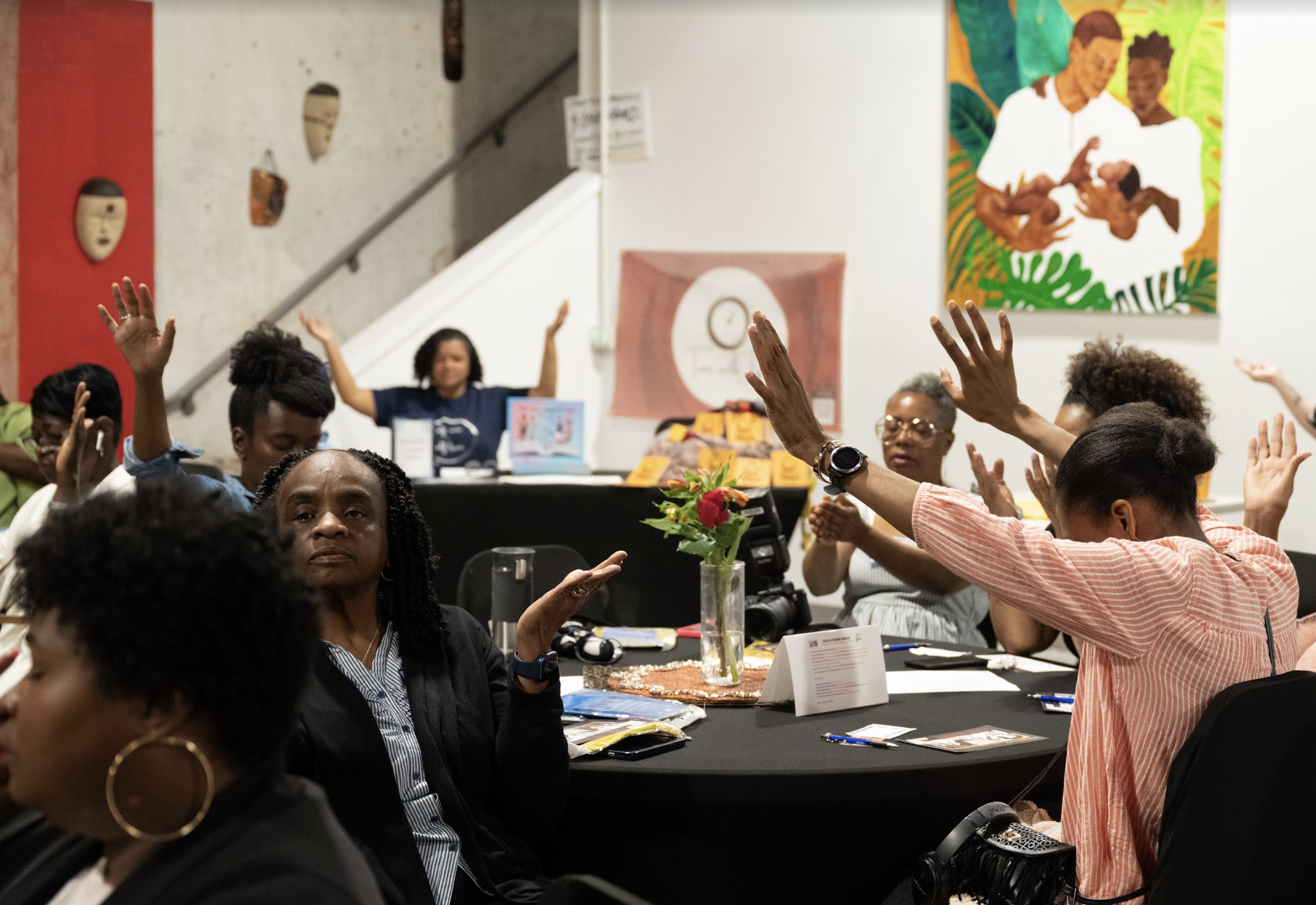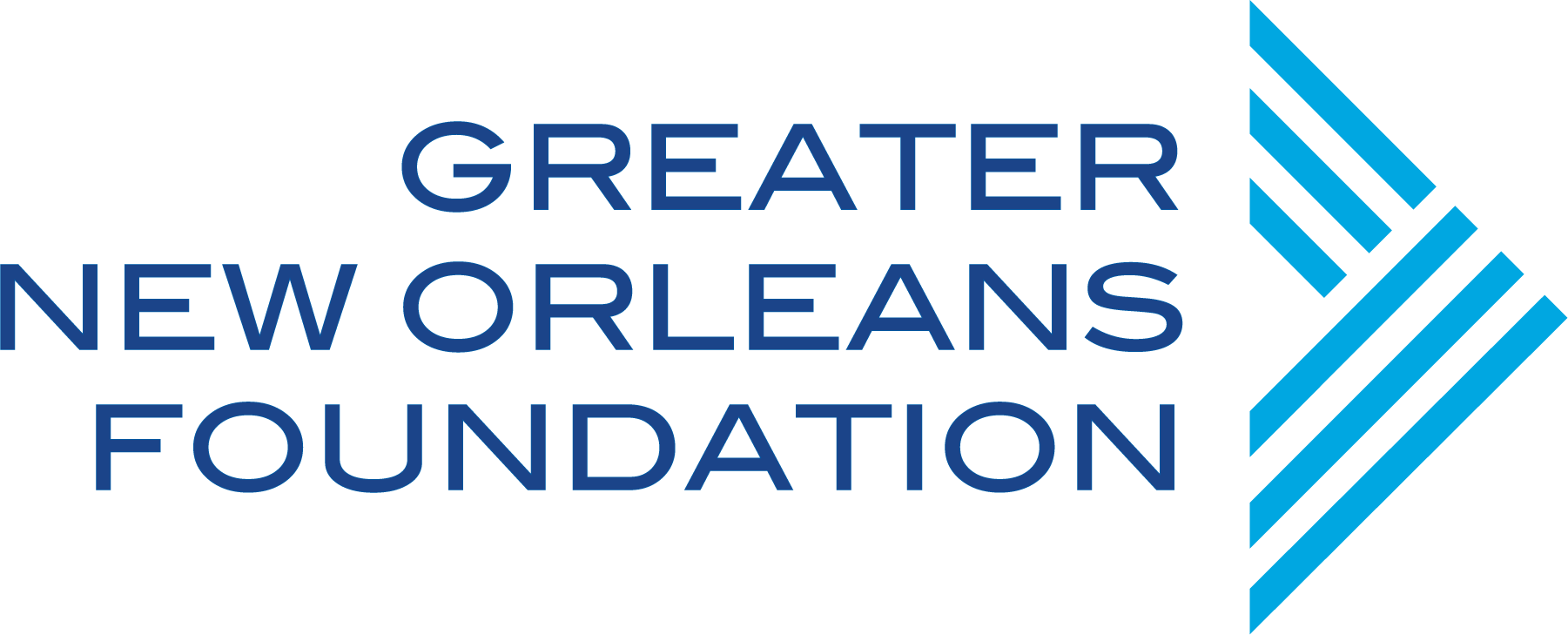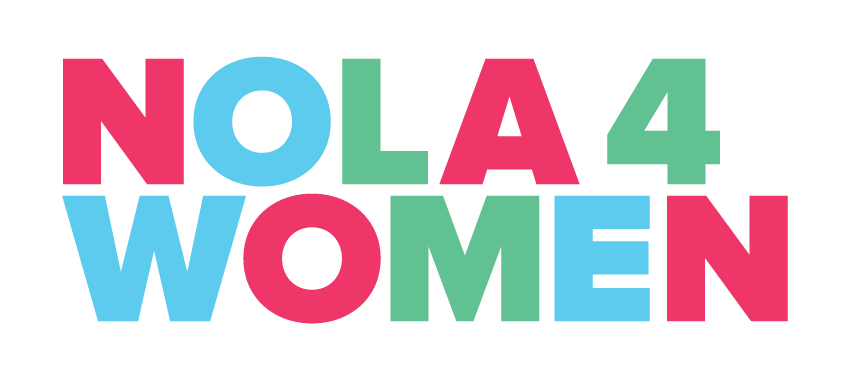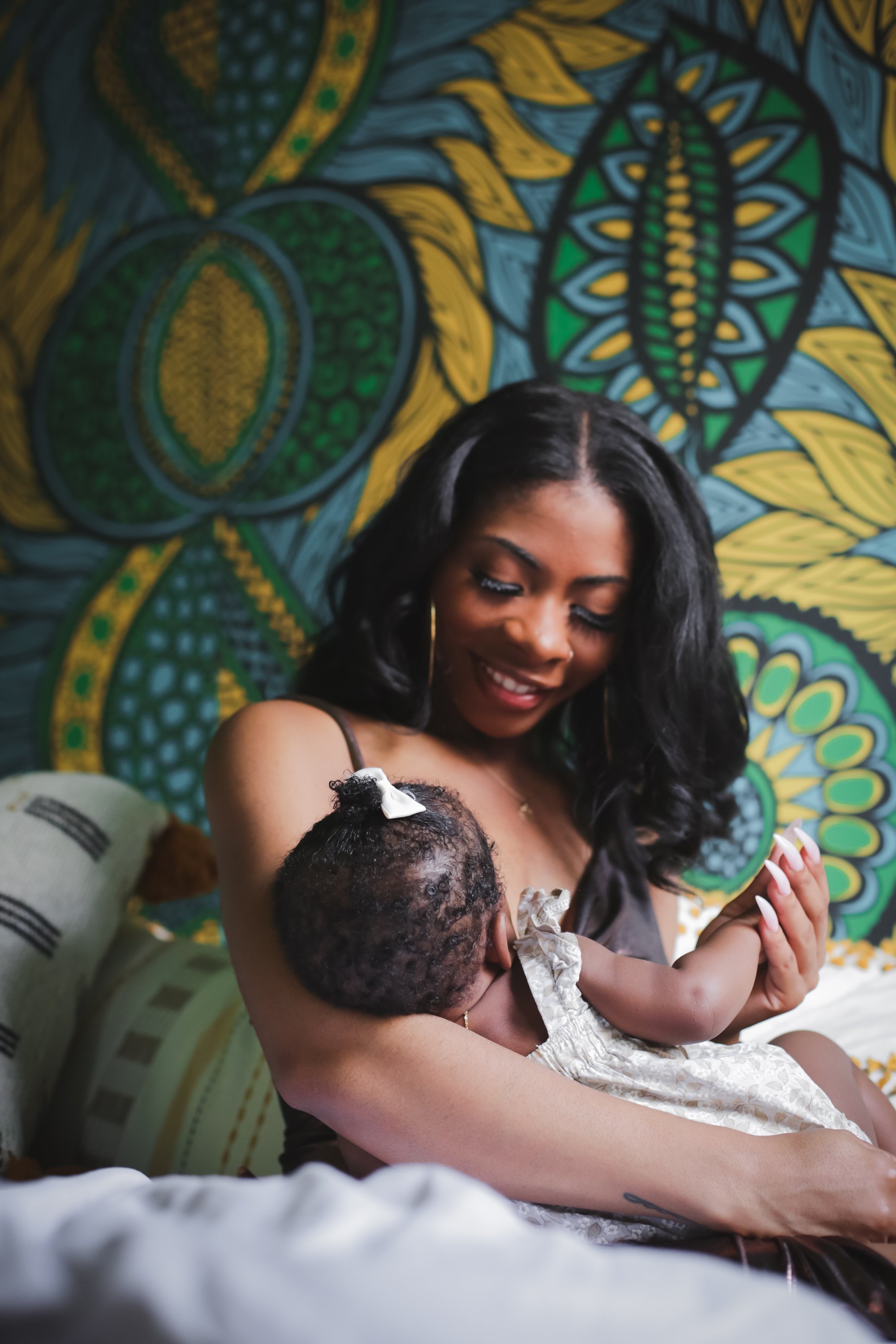
BIRTHRITE
“Race isn’t a risk factor in maternal and child health. Racism Is.”
- Dr. Joia Crear-Perry
Founder & President, National Birth Equity Collaborative
BirthRite is a cultural advocacy program for breastfeeding in which we advocate for breastfeeding as a socially expected and accepted ritual for mothers of infants and toddlers.
The program also brings awareness to the alarming research on rising poor birth outcomes for African American women, regardless of economic class.
WHY BIRTHRITE?
BirthRite uses cultural and creative strategies such as photography, poetry, vision boards, film-making, and theater to help mothers and fathers see themselves as being strong parents, good citizens, and wonderful models of men and women in our community.
Provide mothers with education, access to health services and material support to help ensure they have healthy babies that will be breastfed.
Currently, serving 25 black women (New Orleans residents) that were pregnant and/or given birth during the COVID-19 pandemic (before or after March 2020).
Project Coordinator: Ayo Fayemi-Robinson
HOW WE
DO IT
Our BirthRite: Our Stories
To elevate the voices of some of the most impacted members of our own community, Ashé Cultural Arts Center partnered with Greater New Orleans Foundation, Saul’s Light, Covenant House, and NOLA4WOMEN to collect and present the stories of new or pregnant mothers. The collective journeys of the mothers illuminate how the pandemic, social unrest, and economic instability impacted pregnancy, motherhood, breastfeeding, mental health, and family well-being.
Ashé Cultural Arts Center and Nola4Women co-created a series of experiences and focus groups that sought to provide safe and healing spaces women to express their sacred stories. Maternal and infant outcomes dispassionately impact Black women. The BirthRite Story Sessions gathered the sharing of 25 women during the height of the pandemic.
Participants shared their truths about being pregnant, giving birth, breastfeeding, and mothering during a time of such vast uncertainty. Depending on COVID-19 data, The BirthRite events and Story Sessions were held virtually and in person. Conversations explored the ways in which unprocessed generational trauma can impact one’s well-being and ways women are able to and supported to express mothering for their children and the family and community connections that support them in doing so. The Circle Facilitator also invited discussion regarding how local leadership could build more equitable maternal and child health policies to address the disparities in life expectancy of BIPOC mothers in New Orleans.
“Black women are three to four times more likely to experience a pregnancy-related death than white women.”
Feeding Ourselves & Our Children
Birthing and mothering can be a mental and physical battle. The pandemic intensified the economic, social, and medical challenges of being Black and birthing. The mental health of Black women in New Orleans was tested to the brink. A mentally healthy mom is just as critical for positive birth outcomes as a mom who is physically while moving through a birthing experience.
For mom and for baby, BirthRite champions breastfeeding as a child’s first nutrition and source of comfort and connection. We also know a mother can only feed a child what is available to her internally and externally. We know that nourishment of the mind, body, and spirit are all vital to a healthy mother and child.
“Even though I had support, I was not mentally prepared for labor. I had a doula and a midwife. I was in pain, but I did not know I had to wait until a certain time to get an epidural. The conflict between obstetricians and midwives negatively impacted my experience.”
“I was homeless. My family was not helpful. I had no one. I was still trying to go to school and work. I do not think it was necessary to get a C-section. It was forced on me because it was easier for the doctor. C-sections have a longer recovery time than natural birth. I was stressed. My baby had jaundice. I had to make frequent trips to the hospital without adequate transportation and needed to find housing. I was doing everything alone, and it was stressful.”
In Times of Crisis, Art Can Empower
Honoring and utilizing the role of artists and culture bearers as trusted messengers in our community, local artists had the opportunity to hear the BirthRite stories.
Through various mediums, such as written and spoken word, storytelling, songwriting, painting, and photography, motherhood experiences were captured.
BirthRite Artist Spotlight: Asante Salaam
“Tapping into divine alignment” 2023
“Honoring presence and connection” 2023
In Times of Crisis, We Need Community
BirthRite mothers participated in an intergenerational sharing as well. Grandmothers shared lessons and guidance from their lived experiences and shared healing wisdom from their expertise and spiritual practice. By gathering guidance that spanned centuries across the Diaspora and families, mothers of all ages could learn from others’ past while integrating with their own inner knowing to create a personal approach for the future.
“I lost my father the day before I gave birth. I did not cope well. I felt as if I had no one because my dad and I were close. I juggled grieving while having my first child. I became depressed after birth. I stopped journaling and praying. I feel as though I lost my mind, and I did not have anyone to talk to because I was the one who listened to everyone.”
Living Unseen, Listening Unheard
One participant recalls a moment in the NICU when the doctor told her information from the chart of another child in the neonatal unit. She continues, “My child was just a number. They see millions of babies. Doctors do not know everything, but a mom knows her child. I knew whether he was hungry or wet based on his cry because he was my child. He could not speak, but knew.”
“Black
Woman
Mother
we are still here
mouths mask
sorrows muted
we mother at the edge
of madness & miscarriage
been waiting for the world
to be sober & safe
our bodies invisible
before & always
who will believe our
pain is human
who will feed
our babies justice
who are we
in a world of fire
but a river, a song
a Black miracle breathing…”
excerpt from: Mothers Unmasked by Kelly Harris-DeBerry, Poet
“They gave me medicine to induce labor. Because it was not working, they kept upping the dose without informing me. They pushed me to my limit. I was in so much pain that I threw up. This made my labor an unpleasant experience because of the extra meds. After labor they kept saying that my blood pressure was high, and I was a candidate for eclampsia. I knew I was fine. I decided to get up and get out because no one was listening to me. They treated me as though I did not know anything.”
“I was in the hospital for two days, and my other daughter could not come to visit. Neither could my parents. My husband and I are the only people who met my daughter. We did not have funeral services.”
Surviving The Pandemic & Racism
“I gave birth during the pandemic and a natural disaster, Hurricane Ida. I had to evacuate New Orleans and delivered by child in another state. One day I will have to explain why everyone’s birth certificate has New Orleans, Louisiana and his has Texas.”
“I started a job at three months. I did not have enough time accumulated for paid family leave. I had to take two months off unpaid.”
“My husband was laid off during the pandemic.”
“I found out I was pregnant and laid off on the same day. I got a job six months later, but I had to stop working at 7 months pregnant. I was worried about bringing a child into the world and how I would earn money. My friend told me that God will take care for the baby, and she was right.”
Caring Through Communal Conversations
In a time of isolation, shared stories can provide a sense of belonging and an emotional outlet for stress. Participants loved hearing the stories of others and seeing that they were not alone. It was comforting that other women had similar and different stories that united their humanity. Today, society seems more digitally connected, but we must not abandon human interaction. We are reminded of this necessity through the benefits of breastfeeding and skin-to-skin bonding between mother and child. One participant said, “I am happy we were here together. I learned that it is ok to make decisions for myself, and it is ok to validate myself, and for my voice to be heard.”
A Village in Action
The BirthRite initiative hosted a community baby shower for expectant New Orleans mothers. Among the many gifts was a journal entitled Mother’s Reflections by author Ty Salvant. The journal reminds women and mothers that they are worthy of celebration through self-reflection and elevated the importance of continuing to document their own journeys. Along with the journal, gifts were brought to the mothers from their community, family, and friends.
What Will Tell Our Children?
Participants expressed that they do not want their children to be anxious or fearful, to internalize a mindset of hopelessness, or beg to be accepted. They want children to powerfully declare who they are despite the current conversation. They want children to determine their own fate. “I will share with my child that he is a changemaker born at an intersection of one world going out and a new one coming in. This is the mentality I had during the pandemic and social unrest…we are birthing a new reality…”
BirthRite Artist Spotlight: Kelly Love Jones
What’s Next for BirthRite?
Moving forward, we know participants’ stories in the BirthRite Story Sessions are at the intersections of our city’s socio-economic outcomes. We will continue to use these stories and art as a conduit to raise awareness of the need for public and private sector investment in maternal and child health.
Project Consultants
Kelly Harris-DeBerry - BirthRite Digital Content Writer
Avery Brewton – Story Session Facilitator
LaDonya Williams – Documentarian
Engagement and Implementation Partners
Covenant House
Saul’s Light
Ashé Cultural Arts Center
Coordinator
Kysha Brown
The BirthRite Story Project was made possible by the support of Greater New Orleans Foundation and NOLA4Women.
